
- Average Rating:
- Not yet rated
- Topic Areas:
- Topical Panels
- Bundle:
- Couples Conference 2022
- Categories:
- Couples Conference | Couples Conference 2022
- Faculty:
- Joseph Winn, MSW, LICSW, CST-S | Sejal Patel, PsyD | Martha Kauppi, MS MFT
- Course Levels:
- Master Degree or Higher in Health-Related Field
- Duration:
- 1:01:35
- Format:
- Audio and Video
- Original Program Date:
- Jun 26, 2022
- Short Description:
- Extrinsic forces, centered in racism, classism, sexism, heteronormativity, ageism, ableism, and other intersecting identities impact relationships. However, they factors are not extrinsic, as we are all steeped in and operate from or are operated on, but these factors making them all too present and, unfortunately, made invisible to us as clinicians and the relational systems that we work with. The panel will define these factors, explore the power of their invisibility and impacts on relationships at the micro, mezzo and macros levels of experience and discuss their clinical implications on relational and systemic therapies.
- Price:
- $59.00 - Base Price

- Average Rating:
- Not yet rated
- Topic Areas:
- Topical Panels
- Bundle:
- Couples Conference 2022
- Categories:
- Couples Conference | Couples Conference 2022
- Faculty:
- Stan Tatkin, PsyD, MFT | Ari Tuckman, PsyD | Ellyn Bader, PhD
- Course Levels:
- Master Degree or Higher in Health-Related Field
- Duration:
- 1:00:34
- Format:
- Audio and Video
- Original Program Date:
- Jun 25, 2022
- Short Description:
- A review of the pitfalls of deception as applied to relationships including therapeutic approaches.
- Price:
- $59.00 - Base Price

- Average Rating:
- Not yet rated
- Topic Areas:
- Topical Panels
- Bundle:
- Couples Conference 2022
- Categories:
- Couples Conference | Couples Conference 2022
- Faculty:
- Peter Pearson, PhD | Tammy Nelson, PhD | William Doherty, PhD | Elliott Connie, MA, LPC
- Course Levels:
- Master Degree or Higher in Health-Related Field
- Duration:
- 57:36
- Format:
- Audio and Video
- Original Program Date:
- Jun 24, 2022
- Short Description:
- Motivational factors may be central in the life of a couple. The panel will describe conflicts due to motivational factors and provide therapeutic options.
- Price:
- $59.00 - Base Price
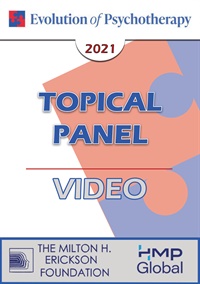
- Average Rating:
- Not yet rated
- Topic Areas:
- Topical Panels
- Categories:
- Evolution of Psychotherapy | Evolution of Psychotherapy 2021
- Faculty:
- Robert Dilts, BA | Nancy McWilliams | Michael Miller | Cloe Madanes, HDL, LIC
- Course Levels:
- Master Degree or Higher in Health-Related Field
- Duration:
- 1 hour
- Format:
- Audio and Video
- Original Program Date:
- Dec 05, 2021
- Short Description:
- Clients generally understand what they need but fail to comply with their own directives and those of the therapists. Resistance will be analyzed from three different therapeutic models.
- Price:
- $59.00 - Base Price
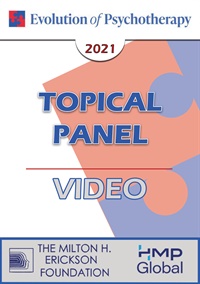
- Average Rating:
- Not yet rated
- Topic Areas:
- Topical Panels
- Categories:
- Evolution of Psychotherapy | Evolution of Psychotherapy 2021
- Faculty:
- Otto Kernberg, MD | Jeffrey Zeig, PhD | Scott Miller, PhD | Michael Miller
- Course Levels:
- Master Degree or Higher in Health-Related Field
- Duration:
- 1 hour
- Format:
- Audio and Video
- Original Program Date:
- Dec 05, 2021
- Short Description:
- The structure of initial interview from four different approaches will be described and discussed.
- Price:
- $59.00 - Base Price
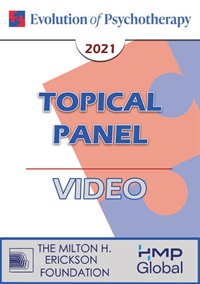
- Average Rating:
- Not yet rated
- Topic Areas:
- Topical Panels
- Categories:
- Evolution of Psychotherapy | Evolution of Psychotherapy 2021
- Faculty:
- Steven Hayes, PhD | Michael Yapko, PhD | Donald Meichenbaum, PhD
- Course Levels:
- Master Degree or Higher in Health-Related Field
- Duration:
- 1 hour
- Format:
- Audio and Video
- Original Program Date:
- Dec 04, 2021
- Short Description:
- Therapy happens in life, not just in the consulting room. Assignments facilitate treatment goals.
- Price:
- $59.00 - Base Price
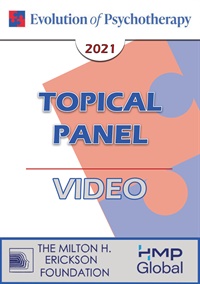
- Average Rating:
- Not yet rated
- Topic Areas:
- Topical Panels
- Categories:
- Evolution of Psychotherapy | Evolution of Psychotherapy 2021
- Faculty:
- Ellyn Bader, PhD | Harville Hendrix, PhD | Helen LaKelly Hunt, PhD
- Course Levels:
- Master Degree or Higher in Health-Related Field
- Duration:
- 1 hour
- Format:
- Audio and Video
- Original Program Date:
- Dec 04, 2021
- Short Description:
- The underlying principles of couples therapy differ from individual therapy for both assessment and treatment. The panelist will discuss and contrast their models.
- Price:
- $59.00 - Base Price
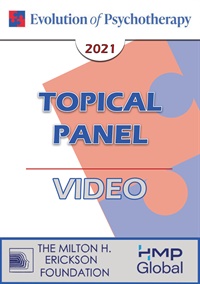
- Average Rating:
- Not yet rated
- Topic Areas:
- Topical Panels
- Categories:
- Evolution of Psychotherapy | Evolution of Psychotherapy 2021
- Faculty:
- Sue Johnson, EdD | Peter Levine, PhD | Donald Meichenbaum, PhD | Elaina Gil
- Course Levels:
- Master Degree or Higher in Health-Related Field
- Duration:
- 1 hour
- Format:
- Audio and Video
- Original Program Date:
- Dec 03, 2021
- Short Description:
- Every therapist needs a method to work with post-traumatic stress disorder. Fundamental techniques will be discussed. Neurological considerations will be offered.
- Price:
- $59.00 - Base Price
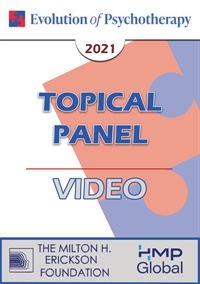
- Average Rating:
- Not yet rated
- Topic Areas:
- Topical Panels
- Categories:
- Evolution of Psychotherapy | Evolution of Psychotherapy 2021
- Faculty:
- Michael Yapko, PhD | Michael Miller | Jeffrey Zeig, PhD
- Course Levels:
- Master Degree or Higher in Health-Related Field
- Duration:
- 1 hour
- Format:
- Audio and Video
- Original Program Date:
- Dec 02, 2021
- Short Description:
- Depression is one of the most common problems brought to psychotherapists. Treatment options and biological substrates will be discussed.
- Price:
- $59.00 - Base Price
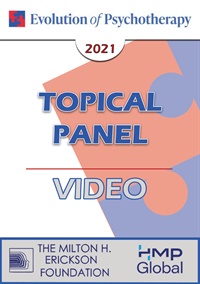
- Average Rating:
- Not yet rated
- Topic Areas:
- Topical Panels
- Categories:
- Evolution of Psychotherapy | Evolution of Psychotherapy 2021
- Faculty:
- Donald Meichenbaum, PhD | Michael Miller | Stephen Gilligan, PhD | Jean Shinoda Bolen, PhD
- Course Levels:
- Master Degree or Higher in Health-Related Field
- Duration:
- 1 hour
- Format:
- Audio and Video
- Original Program Date:
- Dec 02, 2021
- Short Description:
- The process of contracting for change in the initial session will be described and discussed. Methods of targeting goals will be compared and contrasted.
- Price:
- $59.00 - Base Price
Please wait ...

